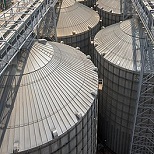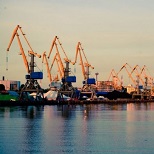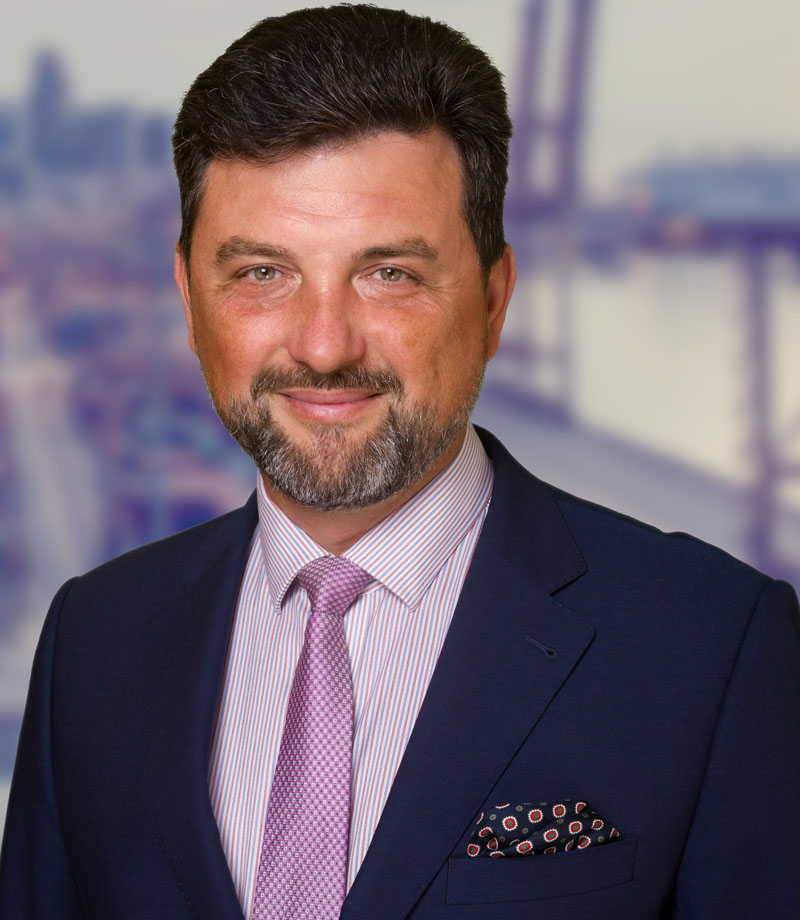Port privatization as strategic goal is a must
The goal of private investment attraction into the Ukrainian sea ports is quite simple: increase of cargo handling volume.
To choose the correct investor, first stage is determination of the investment scope. For this purpose, an inquiry on description of the company, its business activity, corporate structure and beneficiaries should be filed. It is also recommended to study financial reports for the last three years regarding the company’s liquidity and solvency; documents concerning its ability to attract cargos, experience in relationship with ports in the process of terminal construction and operation, including in Black Sea Region and CIS countries. The final stage is to obtain explanation of the reasons for investment, only then followed by seeking investors.
First, search of investors usually concerns terminal operators and stevedore companies, shipping lines and cargo owners. Sometimes such groups intersect or combine into joint ventures or consortia for the purpose of force consolidation. For instance, the consortium established for LNG-terminal construction in Poland includes the following companies: Saipem (Italy), Saipem SA France), Techint Compagnia Tecnica Internazionale (Italy), Snamprogetti of Canada, PBG SA і PBG Export Sp. z.o.o. (Poland). They may be supported by financial and industrial groups, building companies etc. But their main feature is experience in operations.
Another example: this year American and Georgian Consortium “Anaklia Development Consortium” starts construction of the deep-water port in Georgia. Total scheduled investments make up 2.5 billion USD, including 100 million USD invested by the Georgian party.
Ukraine has also bright examples of such development. The American company “Cargill” is going to purchase 51% of grain terminal being under construction in the Yuzhnyi Sea Port by the stevedore company “MV Cargo”. “Cargill” will invest nearly 100 million USD. In the Nikolayev Sea Port the Chinese corporation has opened a handling complex for grain & oilseeds and their derivatives. In 2016 COFCO Ltd. has completed acquisition of the affiliate Noble Group ltd. In 2014 initial cost of 51% at Noble Agri made up 1.5 billion USD, while the remaining 49% were purchased by the Chinese company COFCO Ltd. in 2016.
Second, which object shall be constructed with the investor involved: either dedicated or multiuser complex? The first type includes terminals rendering services for one or several clients, except competitors. Such objects are usually owned by shipping lines or large cargo owners, e.g. liquid gas handling terminal.
Multiuser terminals render services under the principle first come – first served. They are usually managed by professional operators not related to cargo owners.
Having understood, which type of object is to be constructed, you may forecast the probable principles its operator may abide. Maybe it will be profitable for operator to detain or to reduce cargo handling within the single logistic chain, as shown by many examples. Construction of own terminals at a single port may result in establishment of some special (grain) terminals, e.g. in Ilyichevsk, Odessa, Yuzhnyi. Large depth near quay walls – this is the key factor of attracting investors.
Methods of investment
Relationship in respect of investments into the Ukrainian sea ports is governed by Articles 25-27 of the Law on Sea Ports of Ukraine. The principal methods of private investments into the ports are the following:
- Performance of investment agreements, i.e. concession / joint venture / lease agreements and others;
- Privatization of the port infrastructure, except strategic objects.
The first problem arising from private investments into the sea port is nature of the investment agreement. Investment agreement means any agreement, the subject of which is investment activity. But such activity may have various forms, so the relevant agreements may have different nature. The legislation does not provide an exhaustive list of agreements which provide investment relationship.
The common flaw of all the similar agreements is that the right of ownership is not subject to assignment under investment agreements. The reason is that investor does not receive any object it could treat as its own, so this type of investment agreements is not widespread.
Privatization always results in assignment on the right of ownership. Both state and other public forms of ownership usually become private property under the sales agreement. Even the most common opinions determine advantages of privatization, as compared with other methods of investment.
Privatization as effective mechanism
The most important and surprising phenomenon is non-professional discussion about port privatization. Someone support privatization while others deny it. Each opponent has its own opinion justified by the most crucial arguments.
These decisions are usually categorical and grounded on limited practice. Different branches of government accuse each other, while this issue has not been analyzed thoroughly. We have to state that 2015 turned out to be one more year of lost opportunities.
No doubt, today political and economic chaos does not facilitate speaking about privatization as set forth in the Law of Ukraine on State Property Privatization dd. 04.03.1992. Article 1 of this Law provides clearly the goal of privatization – increase of social and economical efficiency in production and attraction of funds for structural reformation of the national economy.
We believe that privatization, no doubt, is a strategic goal and the most effective and actual mechanism required both for reforming port economy and restoring political situation in Ukraine. Private investor, especially foreign one, does not support any corruption, is a good businessman and is ready to help state authorities in any extraordinary cases.
Of course we made up a little bit idealized image of today investor. In practice its specifications depend mostly on legal mechanisms adopted by state authorities and on the approved policy. Of course, non-transparent privatization of vital economic objects, such as state enterprises at sea ports, by clans of oligarchs and monopolists may only deteriorate such a difficult situation. Another important factor is that the object should get ready to privatization both in technical and legal aspects. The agreement should include provisions defending the personnel’s rights, the investor’s obligations upon bringing the unprofitable or short-profitable objects in conformity with safe and efficient operation, and so on.
Sales agreements on privatization objects shall certainly provide fair price which may facilitate satisfaction of public interest. Without effective and competitive economy such “war” either will become endless or will result in defeat. In our honest opinion, only privatization of suitable objects by responsible investors in the framework of fair competition is able to restore port economy and to make it competitive. Such fair competition shall be declared by the government and shall comply with its political will, of course, in the midst of general democratization and liberalization of social, economic and political climate.
Time required for strategy
Despite that the process of port denationalization is launched, it is quite sporadic and fragmentary. If any systematic approach is set in this regard, maturity of the grounds for reformation will get obvious enough. The final stage will be systematization of experience and recognition of the necessity in its distribution.
Although we are facing difficult tasks, we cannot cease the process of port denationalization and privatization in Ukraine, as shown by the examples of the Odessa and Nikolayev Sea Ports. We should not set aside the foreign experience. Even chaotic and poorly organized privatization of the Russian ports turned out to be effective.
Most opponents of port denationalization and privatization in Ukraine rely on state investments. But there are very few chances on domestic investment into port economy. The government charges most of the state enterprises’ incomes as dividends. Poor management of state investments causes more essential problems.
If private capital makes prompt decisions within several weeks or even days, the state bureaucratic apparatus needs several months or years to make similar investment decisions, despite that we are living in the 21st century.
Other opponents of port privatization in Ukraine do not deny denationalization in general. They deny just privatization, mainly with reference to advantages of concession. Of course, everything depends on conditions at a certain business entity being subject to denationalization. Most Ukrainian sea ports have too little shares of state ownership, so there is no sense to treat the issue of privatization seriously. Under other equal conditions in Ukraine, today privatization is the most effective method to invest private capital into sea port economy. The main goal is to increase efficiency of port operation, and attraction of investments is the necessary task to achieve it. So we forget the goal and discuss which tool is better: wrench or hammer.
Published in the journal “Ports of Ukraine”

Probing Virgin Ground: Worries of international consultants in Ukraine Ukraine’s long proclaimed struggle for the foreign direct inve...
.jpg)
Ukrainian Law on Inland Water Transport Finally in Force President of Ukraine Volodymyr Zelensky has signed the Law on In...

Feasibility study for the concession of the container terminal “Chornomorsk” ready in early 2021 The working Group on the implementation...
 November Transport, Shipping & Port News2020.12.04
November Transport, Shipping & Port News2020.12.04Dear Reader! Our monthly digest is confined to ports, terminals, shipping and transport of Ukraine. Ukrzaliznyts...

Ukraine as a littoral state commanding most of the Black Sea north coast along with the Azov Sea north occupies a strate...
 Opportunities in the Ukraine2019.07.10
Opportunities in the Ukraine2019.07.10At the moment there is a concession pilot project conforming to European norms under way for the public stevedoring companies in Olvia (form...
 Endgame or a Path to Possibilities?2019.05.24
Endgame or a Path to Possibilities?2019.05.24Ukrainian port industry is growing rapidly and the upcoming vote for concession legislation should only confirm this trend. ...

1. Who’s pushing? The acting Cabinet of Ministers led by Volodymyr Groisman initiated the draft law development in summer 2016. The EBRD...
 A step in the right direction2018.08.27
A step in the right direction2018.08.27For years, it has been the worst-kept secret for any foreign investor that port concession tender conditions in Ukraine were often drafted t...

Until recently, investing in Ukrainian port infrastructure was considered quite risky, due to an outdated regulatory framewor...





 Odessa, 65014, Ukraine, 1 а, Gretska St
Odessa, 65014, Ukraine, 1 а, Gretska St
